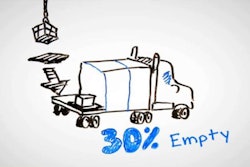 Sitting in a freight yard waiting for a trailer — does such constitute total relief from duty? With new FMCSA guidance on off-duty time, the answers to such questions may increasingly be up to you, the driver.
Sitting in a freight yard waiting for a trailer — does such constitute total relief from duty? With new FMCSA guidance on off-duty time, the answers to such questions may increasingly be up to you, the driver.I’ve written about this provision of the new hours rule before, of course: in the recent rewrite of the hours of service regulations that went into effect July 1, FMCSA excluded time spent resting in a parked truck from the definition of on-duty time. Some viewed it as a mere technicality, a bone thrown to daycab or pickup drivers to force the 30-minute off-duty rest break to make sense if there happened to be nowhere else palatable to go during said break other than the front seat of the parked truck. Attempting to harmonize, as it were, the letter of the law with the reality of life out on the road, given the new break requirement.
But, as I wrote briefly in this story on the hours regs, the exclusion might also be seen as a flexibility-enhancing measure that could mitigate against long delays at shippers/receivers eating up cumulative on-duty hours.
Leading into the July 1 enforcement date, FMCSA would only reiterate their general guidance on what would constitute off-duty time, though they admitted that such time would be next to impossible to enforce as long as the truck was actually parked during whatever off-duty period was logged.
Just days after the July 1 implementation date of the new rules, I had this back-and-forth in response to a query from an advisor to a fleet, his comments in italics:
In the last edition you said that in the new hours rules, FMCSA says time spent in a parked truck waiting to load or unload can be shown legally off duty. Where do I find this in writing? We’re being told this is wrong, can you help me? I really need clarification on this — our safety director is saying different.
It’s a gray area, David – talking to FMCSA, basically they acknowledge that it depends on the circumstances, generally, of waiting time to load or unload. If a driver is “released from all responsibility” for the truck while sitting at a shipper/receiver facility, which you could read as analogous to, say, sitting in a parking lot waiting for the place to open or waiting for an appointment time or something of this nature (i.e. you’re not sitting in a line of trucks with the truck running, waiting for an open dock, etc.), then it seems reasonable to log that time off-duty and permissible under the new on-duty definition. Here’s how it reads:
“FMCSA proposed to exclude from the definition of on-duty time any time resting in a parked CMV…. FMCSA is adopting the changes as proposed. FMCSA emphasizes that the changes to the definition do not alter the existing parts of the definition that define, as on duty, ‘(5) All time loading or unloading a commercial motor vehicle, supervising, or assisting in the loading or unloading, attending a commercial motor vehicle being loaded or unloaded, remaining in readiness to operate the commercial motor vehicle, or in giving or receiving receipts for shipments loaded or unloaded.’ Unless a driver is released from all responsibility for the vehicle while waiting to be loaded or unloaded, time spent waiting is still considered on duty time.”
The text above is from the Final Rule. Here’s a link to the full text if it helps.
As FMCSA basically put their interpretation of this to me (and I feel like that’s how this reads): in circumstances where you can reasonably say, “Hey, I know basically how long it’s going to take them to get to me so I’m going to go off-duty for that time and sit here in the driver seat and rest,” you can log it off-duty. Definitely a gray area, and FMCSA acknowledges as much – they also say, “We’re aware how nearly impossible this is to enforce,” essentially.
I’d be interested to hear your safety director’s thoughts on it if he/she thinks the scenario I’ve described or similar scenarios wouldn’t be legal to log off-duty – it could be an item to further discuss if folks are really reading the rule quite differently.
Yes, everybody I have spoken to is going to take advantage of the gray area due to the fact that productivity and driver wages continue to slip…. I have been driving [our safety director] nuts because everything you read says carriers are really going after the advantage of using off duty while sitting at a customer to help the drivers with available work hours. The issue I see is when a driver arrives at a location and he is not responsible for loading or unloading, just waiting, is he considered relieved of duty until he is finished? And it reads both ways. Thanks for your time and concern on this. I’m positive all companies are really concerned about how this will be handled.
[END EXCHANGE]
The problem comes in with these phrases in the on-duty definition to include time spent “attending a commercial motor vehicle being loaded or unloaded, remaining in readiness to operate the commercial motor vehicle, or in giving or receiving receipts for shipments loaded or unloaded.” So you’re on-duty when you’re walking in to hand over the paperwork but could potentially be off-duty if you’re just waiting for the truck to be loaded but aren’t attending the vehicle. And if you’re waiting for a call that could come at any time to tell you a dock is ready but are otherwise doing absolutely nothing, are you “in readiness” to drive or just resting, off-duty?
It depends on what your definition of is is, right? In any case, just one week following that exchange, FMCSA went farther with off-duty guidance in a way that I think moves closer to making the gray areas less so, but not entirely white or black or at least non-gray, expressly giving drivers latitude to determine when they are and aren’t off duty.
The old off-duty guidance stretched back to 1997, and given the fact of the 30-minute mandatory break today, the agency noted in new guidance issued a week and a half ago now, the old off-duty guidance was in contradiction with current rules. Below see how they changed it: language cut from the guidance is striken, while language added is in [/] and italicized. Keep in mind that the context for the guidance is logging off-duty breaks in light of the 30-minute mandatory break requirement, but if “routine stops” can be interpreted to include stops at shipper/receiver facilities, wouldn’t delays there where the “driver is at liberty to pursue activities of his/her own choosing” qualify as off-duty time (note that FMCSA removed the requirement for off-duty time that the driver must be able to leave the vehicle and premises)?
Tell me your thoughts on it and/or what you may or may not have been hearing from safety directors and law enforcement out there here in the comments. There’s some related discussion about some of the seeming contradictions in all of this under the news story about the revised guidance here.
[GUIDANCE TEXT BEGINS — DOWNLOAD THE FULL FEDERAL REGISTER NOTICE HERE]
Question 2: What conditions must be met for a Commercial Motor Vehicle (CMV) driver to record meal and other routine stops made during a tour of duty as off-duty time?
Guidance:
[Drivers may record meal and other routine stops, including a rest break of at least 30 minutes intended to satisfy 49 CFR 395.3(a)(3)(ii), as off-duty time provided:]
1. The driver must have been[is] relieved of all duty and responsibility for the care and custody of the vehicle, its accessories, and any cargo or passengers it may be carrying.
2. The duration of the driver’s relief from duty must be a finite period of time which is of sufficient duration to ensure that the accumulated fatigue resulting from operating a Commercial Motor Vehicle (CMV) will be significantly reduced.
3. If the driver has been relieved from duty, as noted in (1) above, the duration of the relief from duty must have been made known to the driver prior to the driver’s departure in written instructions from the employer. There are no record retention requirements for these instructions on board a vehicle or at a motor carrier’s principal place of business.
4.[2.] During the stop, and for the duration of the stop, the driver must be at liberty to pursue activities of his/her own choosing and to leave the premises where the vehicle is situated.











